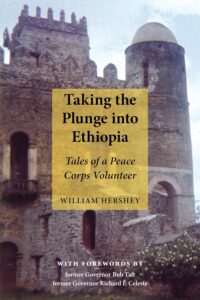Review | William Hershey’s TAKING THE PLUNGE INTO ETHIOPIA
 Taking the Plunge into Ethiopia
Taking the Plunge into Ethiopia
by William Hershey (Ethiopia 1968-70)
The University of Akron Press
134 pages
2023
$24.95 (paperback); $18.99 (Kindle)
Reviewed by Cynthia Nelson Mosca (Ethiopia 1967-69)
•
For those of us who are old enough to have served in the Peace Corps in the ’60s and ’70s those years conjure up vivid images of the war in Vietnam, the assassinations of John F. Kennedy, Martin Luther King, and Robert Kennedy, the targeting of groups like the Black Panthers by the FBI, and of course the hippie movement, rock and roll, flower children and protest songs performed by Joan Baez, Pete Seeger, and Buffy St. Marie. Taking the Plunge into Ethiopia is a sobering look at the second largest country in Africa as well as our own past and present turbulence.
Bill was part of a team of Pulitzer Prize-winning journalists at the Akron Beacon Journal. His book is in part a collection of essays he wrote for the newspaper, and it is also how his Peace Corps experiences came to influence his view of the world. It is a sober look at Ethiopia when the deposing of Emperor Haile Selassie was brewing. But all is not serious, it also has humorous laugh out loud moments. His dad’s impressions of visiting Bill and touring the country is precious. “Even by plane he (Bill’s dad) got a taste of Ethiopian travel. At one stop he said something like, “Bill, I think a sheep just came aboard.” He was right.”
“Life in Dabat was sometimes tranquil, often hectic with lesson plans to be made for students who seriously wanted to learn, and once in a while conflictual.
“It was an enchanting night. There were no streetlights, no neon signs flashing ads for “hamburgers,” cut-rate mufflers and eternal life. The only brightness came from the moon and the stars blinking through a haze less sky.
It was the hushed beauty, interrupted only by the occasional cry of a hyena.”
But suddenly the poetic silence was broken. Rocks came crashing down on the tin roof at the house of the only American in town. Then the rustle of footsteps faded away into the no longer beautiful darkness.”
The cleaning of shintabetes (outdoor toilets) was at the root of this unwelcome disturbance. It was the beginning symptom of strong anti-American sentiment by university students which was spreading throughout the country via shortwave radios. Student strikes were common in Ethiopia at this time and though more than a few Peace Corps Volunteers left the country before the completion of their two years of service, Bill was not one of them. He modestly claims that at one point about 100 students asked him to stay, but he believes it was due to their desire to pass the eighth grades exams and not to him personally.
This is the story of friendships, a commitment to service, a rescue from a refugee camp in Sudan, and fond memories of an ancient and proud nation. These 134 pages are packed full. It is not just a book of memorable stories, but it is also a sober look at today’s American politics.
Upon completion of a graduate school program in 1968, Bill had not seriously considered the Peace Corps. He joined at the urging of Dr. Joseph Washington, dean of the Chapel at Albion College, who admonished him to “stop talking and start doing.” Little did he know what an impact it would have on his life and career. This is the perfect read for a gray January day by the fire, perhaps with glass of your favorite beverage. Enjoy!
•
Cynthia Nelson Mosca (Ethiopia 1967-69) spent over forty years in the field of education. She has taught all ages and ended her career as the Director of Language Minority Services in Cicero, Illinois. She has also served as adjunct faculty for several Chicago area colleges, where she taught graduate courses in bilingual education. Cynthia is currently part of a Peace Corps Virtual Service Project in Ethiopia and a member of the EERPCV board. She recently published through Peace Corps Writers Imprint, Letters from a Wondrous Empire, an epistolary memoir.
No comments yet.
Add your comment